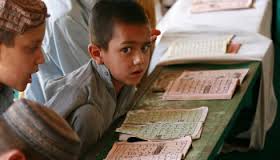Is the hostile Western Media blackening the name of a pious Koran teacher? Child sex abuse allegations involving one of Iran’s best-known Koran reciters are causing shock and anger in the country, after several accusers took went public with the claims.
The alleged victims and their families told BBC Persian that they had decided to speak out after failing to get justice through official channels.
Saeed Tousi, 46, who has ties to both the religious and political elite, faces accusations that he assaulted 10 boys, all Koran students from religious families.
Mr Tousi has strongly denied the claims, which surfaced last week when some of the alleged victims took the unusual step of telling their stories to the foreign media.
Iranians are not used to hearing such sensitive issues discussed openly in public, and the revelations have prompted much anguished and impassioned debate on the social media platforms which many now use to follow and share news.
BBC Persian’s interview with the alleged victims was viewed 400,000 times on its Telegram channel.
Judiciary chief Ayatollah Sadeq Amoli-Larijani warned against co-operating with “hostile media”
Accuser
One of the accusers described an assault which he said took place in a public bath house when he was 12 years old.
“I was so shocked I couldn’t understand what was going on,” he said. “I was so afraid to say anything because of the shame it would bring upon my name, but then I found out that there were so many other cases among his students. So I broke my silence.”
Saeed Tousi is one of Iran’s most revered Koran reciters and has many students
The accusers say they launched an official complaint about Mr Tousi six years ago, which resulted in him being brought to court. The case was dropped and a second alleged victim told the BBC he had now “lost all hope” that justice would be done.
A spokesman for the judiciary, Gholam Hossein Mohseni-Ejei, said there was “insufficient evidence” to investigate the abuse claims.
Reaction
“Another shameful page in the history of the Islamic republic,” wrote one user, called Meysam. “People are being abused under the banner of religion… and no-one is going to be held accountable.”
“If the victims had been girls, [the authorities] would’ve accused them of being dressed inappropriately and provocatively. And they would argue that the assault was understandable” wrote another, called Somayeh.
“But in this case, the victims are men and the [alleged] abuser was a member of the Supreme Council of the Koran.”
As with many things in Iran, the case has become highly politicised.
Mr Tousi’s closeness to the establishment, and in particular to the Supreme Leader, Ayatollah Ali Khamenei, has been invoked by both his supporters and detractors.
“Tousi has won several prizes which were awarded by the Supreme Leader,” exiled Iranian human rights activist and lawyer Mohammad Mostafaei told the BBC. “[He has] taken advantage of this link to avoid prosecution.”
Mr Tousi, meanwhile, has suggested that the allegations against him were part of a campaign to discredit the Supreme Leader and his conservative allies.
The head of the judiciary, Ayatollah Sadeq Amoli-Larijani, issued a veiled threat to Mr Tousi’s accusers, describing them as “ungrateful people” and saying anyone who co-operated with what he called the “hostile foreign media” would face prosecution.
A prominent MP, Ali Motahari, spoke out in support of the alleged victims.
“It’s not natural the investigations into this case have taken so long,” he told local media. “This drawn out process has forced the plaintiffs to resort to the foreign media and now they’re being accused of being anti-establishment.”
Tough questions
Many people who have spoken to BBC Persian about the case, both in interviews and on social media, have expressed concern about the impact going public might have on the complainants.
Conservative values and taboos mean victims of sexual assault in Iran – especially male victims – risk being shamed and attacked for speaking out.
“We should be concerned that the alleged victims might not go unharmed because of all the chatter on social media,” said Iran-based lawyer, Abdolsamad Khoramshahi. “Don’t they want to continue to live in this society?”
It is not clear if further action will be taken by the authorities in response to the public outcry, but whatever happens next the case has left many Iranians – some for the first time – asking very tough questions about the people they usually look to for spiritual and moral guidance.
“Being religious is not a guarantee of morality in society,” said Nader, a BBC Persian viewer. “In certain cases, being religious provides protection against immoral and illegal behaviour.”
